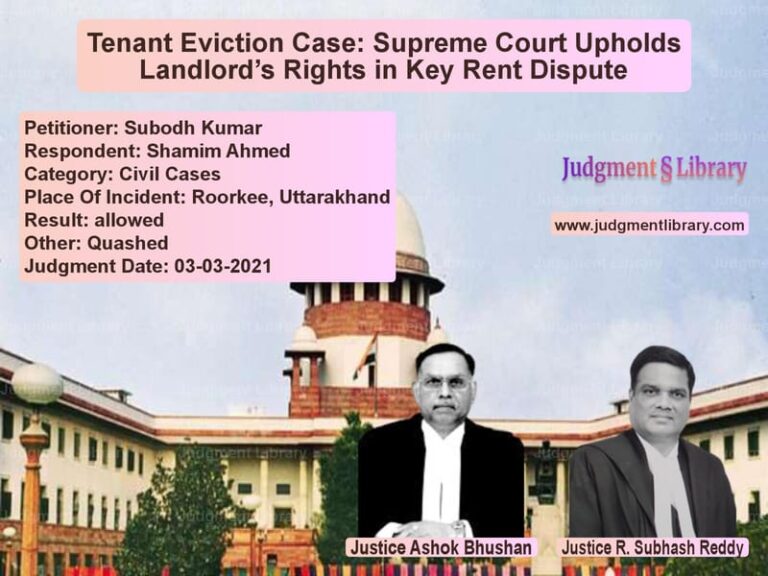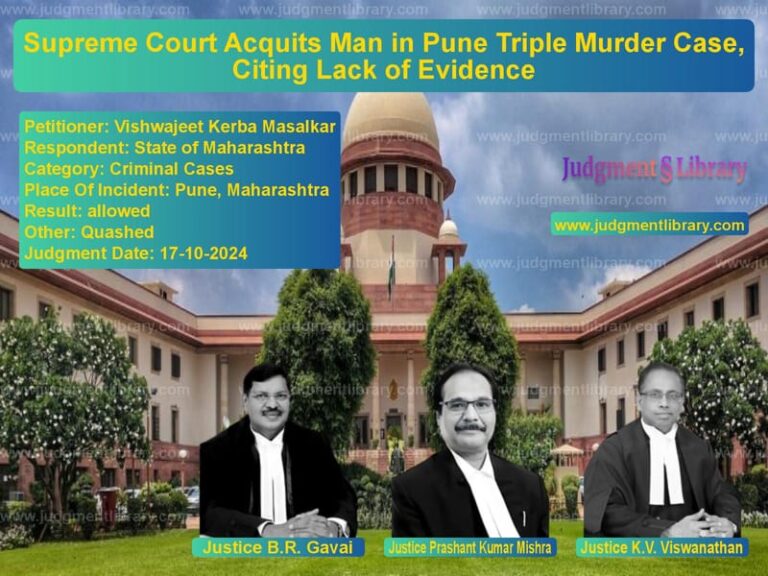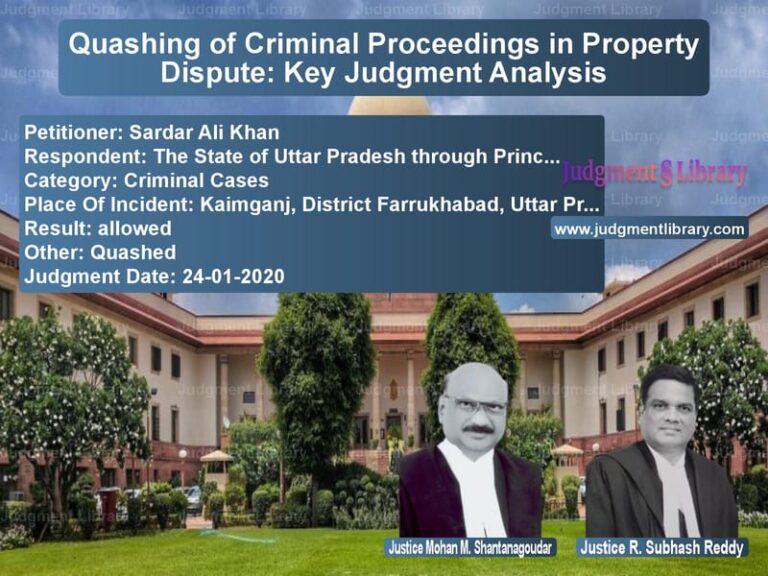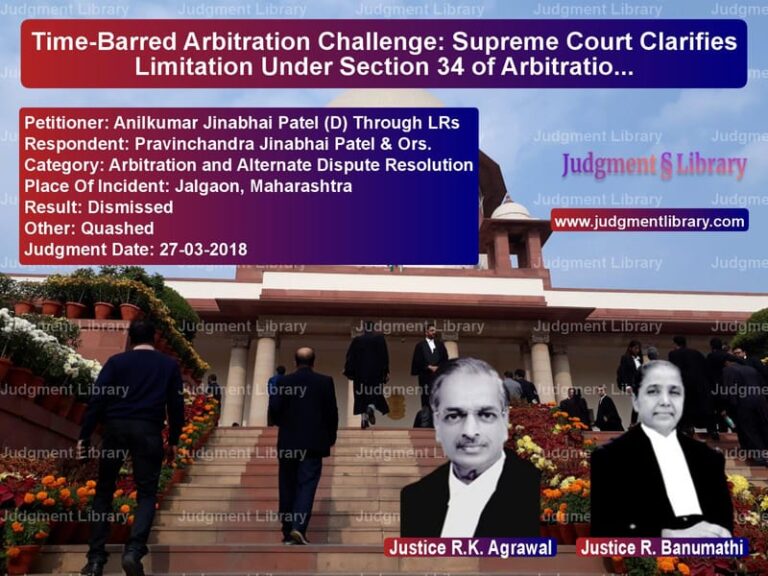Supreme Court Rules on Employment Termination and Seniority Rights in APSRTC Case
The case of APSRTC vs. A.U.M. Rao & Ors. deals with employment termination, re-engagement, and the rights of contract employees concerning seniority and regularization. The Supreme Court had to decide whether an employee, who was terminated and later re-engaged, was entitled to continuity of service for regularization purposes.
The dispute arose when APSRTC (Andhra Pradesh State Road Transport Corporation) terminated the employment of a contract driver after a disciplinary inquiry. Following an internal review, the employee was re-engaged, but without continuity of service. The High Court directed the Corporation to grant continuity of service, a decision challenged before the Supreme Court.
Background of the Case
The key events in the case were:
- In February 2007, the respondent was appointed as a contract driver after undergoing a selection process.
- A disciplinary inquiry was initiated against the respondent for alleged misconduct.
- Following the inquiry, the respondent’s services were terminated.
- Upon departmental review, the Regional Manager ordered the re-engagement of the respondent on February 3, 2012.
- The respondent filed a writ petition before the Andhra Pradesh High Court, seeking continuity of service and consequential benefits.
- The Single Judge allowed the petition, citing a previous decision in a similar case (W.P. No. 2786/2012).
- The Division Bench of the High Court upheld the Single Judge’s decision.
- APSRTC challenged the High Court’s order before the Supreme Court.
Legal Issues Considered
The Supreme Court examined the following key legal questions:
- Was the respondent entitled to continuity of service despite being terminated and re-engaged?
- Did the High Court err in granting continuity of service without setting aside the termination order?
- Did the APSRTC follow due process in terminating and re-engaging the respondent?
- Would granting continuity of service impact the seniority and rights of other contract employees?
Arguments by the Appellant (APSRTC)
The APSRTC, represented by senior counsel, made the following arguments:
- “The respondent was terminated following a full-fledged disciplinary inquiry, which was not challenged.”
- “Re-engagement was a fresh appointment and did not entitle the respondent to continuity of service.”
- “The High Court erred in granting continuity of service without setting aside the termination order.”
- “Granting continuity of service would unfairly impact the seniority of other contract employees.”
Arguments by the Respondent (A.U.M. Rao)
The respondent countered with the following arguments:
- “The disciplinary inquiry violated principles of natural justice.”
- “Since the Corporation re-engaged him, his earlier service should be counted for regularization purposes.”
- “The High Court rightly applied its previous ruling to ensure fair treatment of contract employees.”
Supreme Court’s Observations and Judgment
The Supreme Court, comprising Dr. Dhananjaya Y. Chandrachud and M.R. Shah, ruled in favor of APSRTC and set aside the High Court’s decision. The Court made the following observations:
“As a matter of first principle, continuity can be granted when an order of termination is set aside. Since the termination was not challenged, the grant of continuity was not sustainable.”
The Court provided the following reasoning:
- The High Court granted continuity of service without invalidating the termination, which was legally untenable.
- Re-engagement was a fresh appointment, and service benefits could not be granted retrospectively.
- The principle of seniority would be unfairly affected if the respondent’s service were counted from before termination.
The Supreme Court further emphasized:
“Seniority must be counted from the date of fresh appointment. Granting continuity of service to a re-engaged employee without setting aside termination would create an imbalance in employee rights.”
Implications of the Judgment
The Supreme Court’s ruling has significant implications:
- It reaffirms that continuity of service cannot be granted unless termination is set aside.
- It upholds the principle that re-engagement is a fresh appointment unless otherwise specified.
- It protects the seniority rights of other employees.
- It ensures that High Court orders in employment matters must follow due process principles.
Final Decision
The Supreme Court allowed the appeal and modified the High Court’s order:
“The High Court’s order is set aside. The respondent’s seniority shall be counted from the date of his re-engagement, not from his initial appointment.”
This ruling clarifies employment termination and re-engagement principles, ensuring fairness in labor disputes.
Petitioner Name: APSRTC.Respondent Name: A.U.M. Rao & Ors..Judgment By: Justice Dhananjaya Y. Chandrachud, Justice M.R. Shah.Place Of Incident: Andhra Pradesh.Judgment Date: 07-12-2018.
Don’t miss out on the full details! Download the complete judgment in PDF format below and gain valuable insights instantly!
Download Judgment: APSRTC vs A.U.M. Rao & Ors. Supreme Court of India Judgment Dated 07-12-2018.pdf
Direct Downlaod Judgment: Direct downlaod this Judgment
See all petitions in Employment Disputes
See all petitions in Termination Cases
See all petitions in Public Sector Employees
See all petitions in Judgment by Dhananjaya Y Chandrachud
See all petitions in Judgment by Mukeshkumar Rasikbhai Shah
See all petitions in allowed
See all petitions in Modified
See all petitions in supreme court of India judgments December 2018
See all petitions in 2018 judgments
See all posts in Service Matters Category
See all allowed petitions in Service Matters Category
See all Dismissed petitions in Service Matters Category
See all partially allowed petitions in Service Matters Category







